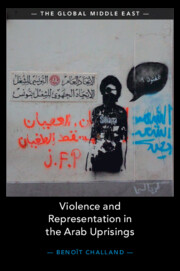Book contents
- Violence and Representation in the Arab Uprisings
- The Global Middle East
- Violence and Representation in the Arab Uprisings
- Copyright page
- Dedication
- Contents
- Maps
- Figures
- Tables
- Acknowledgments
- Prolegomenon: A Two-Layered Book
- Introduction
- Part I The Making of Latent Citizenship
- 1 Revisiting the Foundations of Citizenship: The Colonial Era
- 2 Post-Independence Aspirations, Security Custodianship, and Latent Citizenship
- Part II Informal Revolutionary Practices (2011–2014)
- Part III Embattled Revolutionary Legacies (2014–2021)
- Sources and References
- Sources and References
- Index
2 - Post-Independence Aspirations, Security Custodianship, and Latent Citizenship
from Part I - The Making of Latent Citizenship
Published online by Cambridge University Press: 02 February 2023
- Violence and Representation in the Arab Uprisings
- The Global Middle East
- Violence and Representation in the Arab Uprisings
- Copyright page
- Dedication
- Contents
- Maps
- Figures
- Tables
- Acknowledgments
- Prolegomenon: A Two-Layered Book
- Introduction
- Part I The Making of Latent Citizenship
- 1 Revisiting the Foundations of Citizenship: The Colonial Era
- 2 Post-Independence Aspirations, Security Custodianship, and Latent Citizenship
- Part II Informal Revolutionary Practices (2011–2014)
- Part III Embattled Revolutionary Legacies (2014–2021)
- Sources and References
- Sources and References
- Index
Summary
Chapter 2 deals with the making of latent citizenship in the post-independence era and the violent biases of so many postcolonial states, in the Middle East in particular. The ferment of democracy existed in the turn of the 19th to 20th centuries, but the closure in the Age of Ideologies, Cold War politics, and Mukhabarat states shut down spaces for civic participation in most Arab republics. The chapter revisits the civility paradigm, and tackles the accounts that Charles Tilly, Norbert Elias, Ahmad Eqbal, Armando Salvatore, Michel Foucault, Antonio Gramsci, John Chalcraft, and Nazih Ayubi have offered about coercion and violence. The question of marginalization in Tunisia and Yemen by 2010 are discussed in light of these historical trajectories.
- Type
- Chapter
- Information
- Violence and Representation in the Arab Uprisings , pp. 112 - 168Publisher: Cambridge University PressPrint publication year: 2023

